Unit5TheTapestryofFriendship课文翻译综合教程四
- 格式:pdf
- 大小:11.46 KB
- 文档页数:4
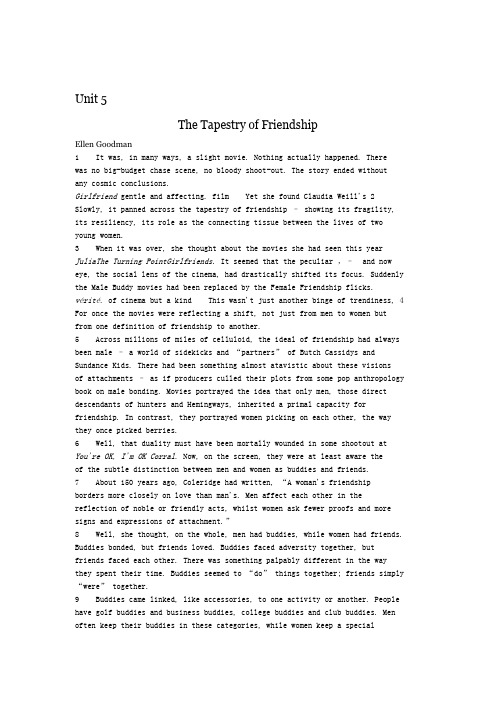
Unit 5The Tapestry of FriendshipEllen Goodman1 It was, in many ways, a slight movie. Nothing actually happened. There was no big-budget chase scene, no bloody shoot-out. The story ended withoutany cosmic conclusions.Girlfriend gentle and affecting. film Yet she found Claudia Weill's 2Slowly, it panned across the tapestry of friendship – showing its fragility, its resiliency, its role as the connecting tissue between the lives of two young women.3 When it was over, she thought about the movies she had seen this year JuliaThe Turning PointGirlfriends. It seemed that the peculiar ,– and now eye, the social lens of the cinema, had drastically shifted its focus. Suddenly the Male Buddy movies had been replaced by the Female Friendship flicks.vérité. of cinema but a kind This wasn't just another binge of trendiness, 4 For once the movies were reflecting a shift, not just from men to women but from one definition of friendship to another.5 Across millions of miles of celluloid, the ideal of friendship had always been male – a world of sidekicks and “partners” of Butch Cassidys and Sundance Kids. There had been something almost atavistic about these visionsof attachments – as if producers culled their plots from some pop anthropology book on male bonding. Movies portrayed the idea that only men, those direct descendants of hunters and Hemingways, inherited a primal capacity for friendship. In contrast, they portrayed women picking on each other, the way they once picked berries.6 Well, that duality must have been mortally wounded in some shootout atYou're OK, I'm OK Corral. Now, on the screen, they were at least aware theof the subtle distinction between men and women as buddies and friends.7 About 150 years ago, Coleridge had written, “A woman's friendshipborders more closely on love than man's. Men affect each other in thereflection of noble or friendly acts, whilst women ask fewer proofs and more signs and expressions of attachment.”8 Well, she thought, on the whole, men had buddies, while women had friends. Buddies bonded, but friends loved. Buddies faced adversity together, butfriends faced each other. There was something palpably different in the way they spent their time. Buddies seemed to “do” things together; friends simply “were” together.9 Buddies came linked, like accessories, to one activity or another. People have golf buddies and business buddies, college buddies and club buddies. Men often keep their buddies in these categories, while women keep a specialcategory for friends.10 A man once told her that men weren't real buddies until they had been “through the wars” together – corporate or athletic or military. They hadto soldier together, he said. Women, on the other hand, didn't countthemselves as friends until they had shared three loathsome confidences.11 Buddies hang tough together; friends hang onto each other.It probably had something to do with pride. You don't show 12off to a friend; you show need. Buddies try to keep the worst from each other; friends confessit.13 A friend of hers once telephoned her lover, just to find out if he was home. She hung up without a hello when he picked up the phone. Later, wretched with embarrassment, the friend moaned, “Can you believe me Athirty-five-year-old lawyer, making a chicken call” Together they laughedand made it better.14 Buddies seek approval. But friends seek acceptance.She knew so many men who had been trained in restraint, afraid of each 15other's judgment or awkward with each other's affection. She wasn't surewhich. Like buddies in the movies, they would die for each other, but neverhug each other.Babbitt recently, that extraordinary catalogue of male She had reread 16 grievances. The only relationship that gave meaning to the claustrophobic lifeof George Babbitt had been with Paul Riesling. But not once in the tragedyof their lives had one been able to say to the other: You make a difference.17 Even now men shocked her at times with their description of friendship. Does this one have a best friend “Why, of course, we see each other every February.” Does that one call his most intimate pal long distance “Why, certainly, whenever there's a real reason.” Do those two old chums ever have dinner together “You mean alone Without our wives”ing. The ideal of intimacy wasn't this parallelYet, things were chang18.playmate, this teammate, this trenchmate. Not even in Hollywood. In the double standard of friendship, for once the female version was becoming accepted asthe general ideal.19 After all, a buddy is a fine life-companion. But one's friends, as Santayana once wrote, “are that part of the race with which one can be human.”友谊面面观埃伦·古德曼1 从多方面看来,这是一部不足挂齿的小制作电影。
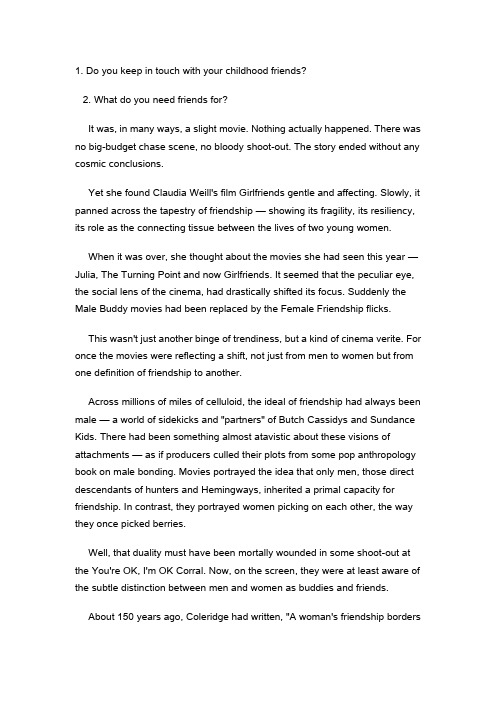
1. Do you keep in touch with your childhood friends?2. What do you need friends for?It was, in many ways, a slight movie. Nothing actually happened. There was no big-budget chase scene, no bloody shoot-out. The story ended without any cosmic conclusions.Yet she found Claudia Weill's film Girlfriends gentle and affecting. Slowly, it panned across the tapestry of friendship — showing its fragility, its resiliency, its role as the connecting tissue between the lives of two young women.When it was over, she thought about the movies she had seen this year —Julia, The Turning Point and now Girlfriends. It seemed that the peculiar eye, the social lens of the cinema, had drastically shifted its focus. Suddenly the Male Buddy movies had been replaced by the Female Friendship flicks.This wasn't just another binge of trendiness, but a kind of cinema verite. For once the movies were reflecting a shift, not just from men to women but from one definition of friendship to another.Across millions of miles of celluloid, the ideal of friendship had always been male — a world of sidekicks and "partners" of Butch Cassidys and Sundance Kids. There had been something almost atavistic about these visions of attachments — as if producers culled their plots from some pop anthropology book on male bonding. Movies portrayed the idea that only men, those direct descendants of hunters and Hemingways, inherited a primal capacity for friendship. In contrast, they portrayed women picking on each other, the way they once picked berries.Well, that duality must have been mortally wounded in some shoot-out at the You're OK, I'm OK Corral. Now, on the screen, they were at least aware of the subtle distinction between men and women as buddies and friends.About 150 years ago, Coleridge had written, "A woman's friendship bordersmore closely on love than a man's. Men affect each other in the reflection of noble or friendly acts, whilst women ask fewer proofs and more signs and expressions of attachment."Well, she thought, on the whole, men had buddies, while women had friends. Buddies bonded, but friends loved. Buddies faced adversity together, but friends faced each other. There was something palpably different in the way they spent their time. Buddies seemed to "do" things together; friends simply "were" together.Buddies came linked, like accessories, to one activity or another. People have golf buddies and business buddies, college buddies and club buddies. Men often keep their buddies in these categories, while women keep a special category for friends.A man once told her that men weren't real buddies until they had been "through the wars" together — corporate or athletic or military. They had to soldier together, he said. Women, on the other hand, didn't count themselves as friends until they had shared three loathsome confidences.Buddies hang tough together; friends hang onto each other.It probably had something to do with pride. You don't show off to a friend; you show need. Buddies try to keep the worst from each other; friends confess it.A friend of hers once telephoned her lover, just to find out if he was home. She hung up without a hello when he picked up the phone. Later, wretched with embarrassment, the friend moaned, "Can you believe me? Athirty-five-year-old lawyer, making a chicken call?" Together they laughed and made it better.Buddies seek approval. But friends seek acceptance.She knew so many men who had been trained in restraint, afraid of eachother's judgment or awkward with each other's affection. She wasn't sure which. Like buddies in the movies, they would die for each other, but never hug each other.She had reread Babbitt recently, that extraordinary catalogue of male grievances. The only relationship that gave meaning to the claustrophobic life of George Babbitt had been with Paul Riesling. But not once in the tragedy of their lives had one been able to say to the other: You make a difference.Even now men shocked her at times with their description of friendship. Does this one have a best friend? "Why, of course, we see each other every February." Does that one call his most intimate pal long distance? "Why, certainly, whenever there's a real reason." Do those two old chums ever have dinner together? "You mean alone? Without our wives?"Yet, things were changing. The ideal of intimacy wasn't this parallel playmate, this teammate, this trenchmate. Not even in Hollywood. In the double standard of friendship, for once the female version was becoming accepted as the general ideal.After all, a buddy is a fine life-companion. But one's friends, as Santayana once wrote, "are that part of the race with which one can be human."。
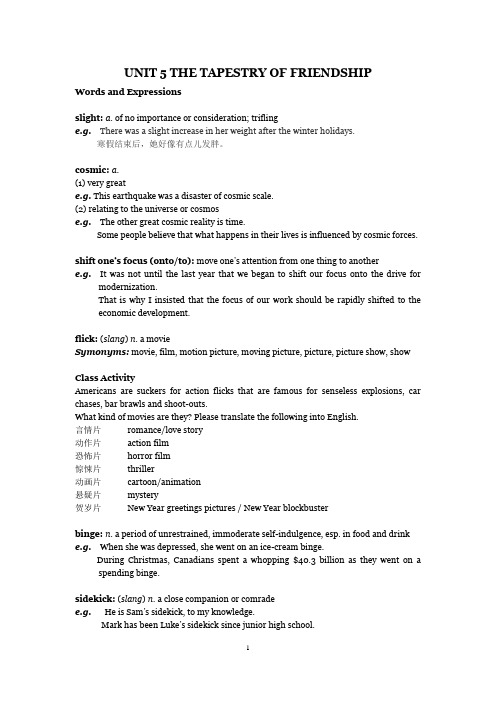
UNIT 5 THE TAPESTRY OF FRIENDSHIPWords and Expressionsslight: a.of no importance or consideration; triflinge.g.There was a slight increase in her weight after the winter holidays.寒假结束后,她好像有点儿发胖。
cosmic: a.(1) very greate.g.This earthquake was a disaster of cosmic scale.(2) relating to the universe or cosmose.g.The other great cosmic reality is time.Some people believe that what happens in their lives is influenced by cosmic forces.shift one’s focus (onto/to): move one’s attention from one thing to anothere.g.It was not until the last year that we began to shift our focus onto the drive formodernization.That is why I insisted that the focus of our work should be rapidly shifted to the economic development.flick: (slang) n. a movieSymonyms: movie, film, motion picture, moving picture, picture, picture show, showClass ActivityAmericans are suckers for action flicks that are famous for senseless explosions, car chases, bar brawls and shoot-outs.What kind of movies are they? Please translate the following into English.言情片romance/love story动作片action film恐怖片horror film惊悚片thriller动画片cartoon/animation悬疑片mystery贺岁片New Year greetings pictures / New Year blockbusterbinge: n. a period of unrestrained, immoderate self-indulgence, esp. in food and drink e.g.When she was depressed, she went on an ice-cream binge.During Christmas, Canadians spent a whopping $40.3 billion as they went on a spending binge.sidekick: (slang)n. a close companion or comradee.g.He is Sam’s sidekick, to my knowledge.Mark has been Luke’s sidekick since junior high school.cull: v. choose from various sourcese.g.Here are a few facts and figures I’ve culled from a lifetime of experience.It’s a collection of fascinating stories culled from a lifetime of experience.inherit: v.(1) receive or take over from a predecessore.g.William inherited a fortune but ran it through in no time.My brother inherited the lion’s share of our father’s money.The new administration inherited the economic problems of the last four years.(2)be born withe.g.Rosie inherited her red hair from her mother.pick on:(1) (Informal)criticize or blame; tease; harasse.g.His older brother always picked on him.The older children liked to pick on the younger ones.(2) single out; choosee.g.The professor always picks on me to translate long passages.He always picks on small points to criticize.border on: come near or verge on, resemble, come nearer in quality, or character e.g.His rigid translation of this literary work borders on literalness.Some of his statements are so incorrect that they border on fraudulence.adversity: n.difficulties; misfortunee.g.Adversity is a good discipline.逆境是最好的磨练。
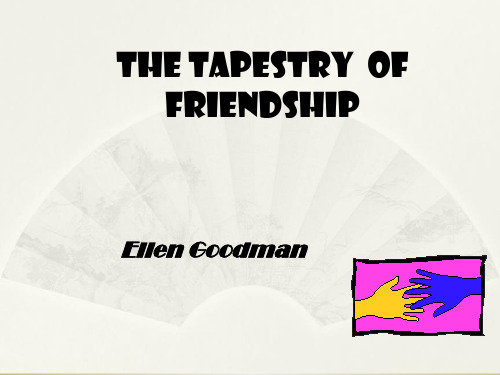

Unit5Some people seem easy to understand: their character appears obvious on first meeting. Appearances, however, can be deceptive.有些人似乎容易了解:他们的个性在初次交往时就表露无遗。
然而,外表可能具有欺骗性。
A Friend in NeedSomerset Maugham1 For thirty years now I have been studying my fellowmen. I do not know very much about them. I shrug my shoulders when people tell me that their first impressions of a person are always right. I think they must have small insight or great vanity. For my own part I find that the longer I know people the more they puzzle me.患难之交萨默塞特·毛姆三十年来,我一直研究我的人类同胞,但至今了解不多。
每当有人跟我说他对一个人的第一次印象向来不错的时候,我就耸耸肩。
我想这种人不是无知,就是自大。
拿我自己来说,我发现,认识一个人的时间越长,我就越感到困惑。
2 These reflections have occurred to me because I read in this morning's paper that Edward Hyde Burton had died at Kobe. He was a merchant and he had been in business in Japan for many years. I knew him very little, but he interested me because once he gave me a great surprise. Unless I had heard the story from his own lips, I should never have believed that he was capable of such an action. It was more startling because both in appearance and manner he suggested a very definite type. Here if ever was a man all of a piece. He was a tiny little fellow, not much more than five feet four in height, and very slender, with white hair, a red face much wrinkled, and blue eyes. I suppose he was about sixty when I knew him. He was always neatly and quietly dressed in accordance with his age and station.我产生这些想法,是因为我在今天早上的报纸上看到爱德华·海德·伯顿在神户去世的消息。
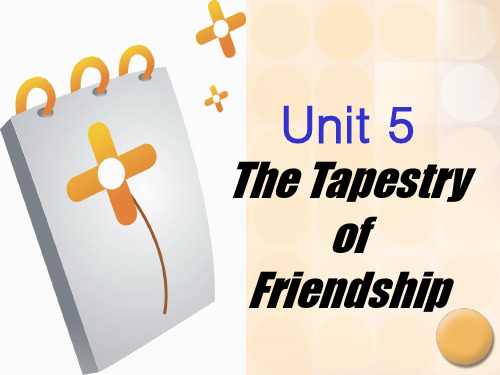
Unit 5The Tapestry of FriendshipEllen Goodman友谊面面观埃伦·古德曼1 从多方面看来,这是一部不足挂齿的小制作电影。
平淡无奇。
没有大成本制作的追逐画面,没有血腥的枪战。
故事结尾也没得出什么意味深长的结论。
2 然而她还是觉得克劳迪娅·韦尔的电影《女朋友》温婉动人。
它缓缓地向我们展现了友谊的全貌——它的脆弱、生命力,以及它连接两个年轻女子人生的纽带作用。
3 电影放完了,她回想起这一年看过的几部电影——《茱莉亚》、《转折点》,还有现在这部《女朋友》。
似乎电影作品镜头这一特殊视角已经大大改变了聚焦对象。
一转眼哥俩好的电影已经被反映闺蜜友谊的影片所替代。
4 这并不仅仅是另一场时尚狂欢,而是一种实录电影的潮流。
就这一次电影反映一种转向,不只是从男性转向女性,而是从友谊的一种定义转为另一种定义。
5 纵观数百万英里长的电影胶片,友谊的理想主角总是男性——满世界都是类似布奇·卡西迪斯及其铁哥们山丹思·基德斯这样的密友、同伴的故事。
这些形影不离的银幕形象似乎是来自远古社会——故事情节好像是制片人从诠释男性间密切关系的人类学通俗读物里选取出来似的。
影片诠释了一个观点,即只有男性——那些猎人和海明威式硬汉的传人——才继承了对于友谊的原始的能力。
相反,女人们总是被描绘成互相挑刺,就好像她们从前挑选浆果那样。
6 哦,那种两面性在OK牧场枪战中一定已经受了致命的枪伤了。
现在,在银幕上,他们至少意识到男人作为哥们、女人作为闺蜜的微妙区别。
7 大约150年前,柯勒律治写道:“比起男性,女性的友谊更接近爱恋。
男性之间相互影响体现在崇高或友善的举动中,而女性不需要这么多实实在在的例证,却需要更多依恋之情的外在表露。
”8 好吧,她想,总体来说,男人有哥们,女人有闺蜜。
哥们相互关联,闺蜜互相喜爱。
哥们共同面对逆境,但闺蜜直面彼此。
显然,两者共度时光的方式互不相同。
Unit 5The Tapestry of FriendshipEllen Goodman1It was, in many ways, a slight movie. Nothing actually happened. There wasno big-budget chase scene, no bloody shoot-out. The story ended without anycosmic conclusions.film Girlfriend gentle and affecting. Slowly, it2Yet she found Claudia Weill’spanned across the tapestry of friendship –showing its fragility, its resiliency, itsrole as the connecting tissue between the lives of two young women.3When it was over, she thought about the movies she had seen this year –Julia,The Turning Point and now Girlfriends. It seemed that the peculiar eye, thesocial lens of the cinema, had drastically shifted its focus. Suddenly the Male Buddymovies had been replaced by the Female Friendship flicks.4This wasn’t just another binge of trendiness, but a kind of cinema vérité. For once the movies were reflecting a shift, not just from men to women but from onedefinition of friendship to another.5Across millions of miles of celluloid, the ideal of friendship had always beenmale –a world of sidekicks and “partners” of Butch Cassidys and Sundance Kids.There had been something almost atavistic about these visions of attachments – asif producers culled their plots from some pop anthropology book on male bonding.Movies portrayed the idea that only men, those direct descendants of hunters andHemingways, inherited a primal capacity for friendship. In contrast, they portrayedwomen picking on each other, the way they once picked berries.6Well, that duality must have been mortally wounded in some shootout at theYou’re OK, I’m OK Corral.Now, on the screen, they were at least aware of thesubtle distinction between men and women as buddies and friends.7About 150 years ago, Coleridge had written, “A woman’s friendship borders more closely on love than man’s. Men affect each other in the reflection of noble orfriendly acts, whilst women ask fewer proofs and more signs and expressions ofattachment.”8Well, she thought, on the whole, men had buddies, while women had friends.Buddies bonded, but friends loved. Buddies faced adversity together, but friendsfaced each other. There was something palpably different in the way they spentther.their time. Buddies seemed to “do” things together; friends simply “were” toge9Buddies came linked, like accessories, to one activity or another. People have golf buddies and business buddies, college buddies and club buddies. Men oftenkeep their buddies in these categories, while women keep a special category forfriends.10 A man once told her that men weren’t real buddies until they had been“through the wars” together –corporate or athletic or military. They had to soldier together, he said. Women, on the other hand, didn’t count themselves as friendsuntil they had shared three loathsome confidences.11Buddies hang tough together; friends hang onto each other.12It probably had something to do with pride. You don’tshow off to a friend;you show need. Buddies try to keep the worst from each other; friends confess it.13 A friend of hers once telephoned her lover, just to find out if he was home. Shehung up without a hello when he picked up the phone. Later, wretched withembarrassment, the friend moaned, “Can you believe me? A thirty-five-year-oldlawyer, making a chi cken call?” Together they laughed and made it better.14Buddies seek approval. But friends seek acceptance.15She knew so many men who had been trained in restraint, afraid of eachaffection. She wasn’t sure which.other’sjudgment or awkward with each other’sLike buddies in the movies, they would die for each other, but never hug each other.16She had reread Babbitt recently, that extraordinary catalogue of male grievances. The only relationship that gave meaning to the claustrophobic life ofGeorge Babbitt had been with Paul Riesling. But not once in the tragedy of theirlives had one been able to say to the other: You make a difference.17Even now men shocked her at times with their description of friendship. Does this one have a best friend? “Why, o f course, we see each other every February.” Does that one call his most intimate pal long distance? “Why, certainly, wheneverDo those two old chums ever have dinner together? “Youa real reason.” there’smean alone? Without our wives?”18Yet, things wer e changing. The ideal of intimacy wasn’t this parallel playmate, this teammate, this trenchmate. Not even in Hollywood. In the double standard offriendship, for once the female version was becoming accepted as the general ideal.19After all, a buddy is a fine life-companion. But one’s friends, as Santayana once wrote, “are that part of the race with which one can be human.”友谊面面观埃伦·古德曼1 从多方面看来,这是一部不足挂齿的小制作电影。